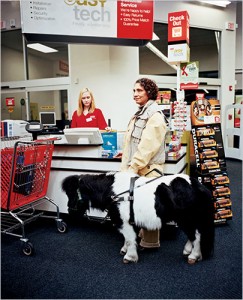 CREATURE COMFORTS: We see a working dog at the grocery store about once a week that has really fascinated my son Ethan. The dog has shown up over the last few months with various folks who appear to be training or actively working with the dog in his harness to navigate the bazillion carts clogging the aisles and get his subject through checkout and back to the car.
CREATURE COMFORTS: We see a working dog at the grocery store about once a week that has really fascinated my son Ethan. The dog has shown up over the last few months with various folks who appear to be training or actively working with the dog in his harness to navigate the bazillion carts clogging the aisles and get his subject through checkout and back to the car.
Because it’s been such an interest for E, it was serendipitous that an article on the very subject showed up in the NYTimes this week about the apparent controversy over working animals. The controversy surrounds the definitions of “disability,” “working animal” and the “tasks” they perform, as well as the ability of the animals’ subjects’ ability to describe why the animals are necessary on outings to stores, restaurants, and on public transportation, even though their subjects may not be the most qualified to describe their needs and tasks in clinical terms. Dogs appear to be most socially acceptable to public officials, over other working animals such as miniature horses and primates, and are doing what they can to make dogs the only acceptable working animals.
My most pressing question after reading this excellent article is why an animal who is not a dog but is trained, disease-free, happy, and well-treated, should be prevented from helping an individual with a mental or physical disability gain better access to equal opportunity?
*** UPDATE: Evil Fizz points out in the comments that the author of the article, Rebecca Skloot, is also a blogger who is updating and answering questions about the article here and here. Of particular interest is an impressive video on the training of Panda, the working horse pictured above. ***
ALSO ON ANIMALS, but really about shitting on single moms (again), Dear Prudence rounds up her best and worst of 2008 and singles out young, single moms as irresponsible rubes that don’t understand their own impulses even as she’s being criticized for doing just that in the original article. If you read the original, the subject is “Pitbulls and Toddlers Make Me Nervous When They Hang Out Together,” but Prudence reads, “The Real Issue is That The Toddler’s Mom Gave Birth Before I Am Socially Comfortable With Single Parents, So Let’s Make The Dog Thing About That.”
The biggest lesson learned is not to write Dear Prudence if you’re a parent before the age of thirty.
WHAT WOMEN WANT: At Jack & Jill Politics, the results of a survey by YWCA on what women want from the Obama administration.
THE AGE OF INNOCENCE?: At Body Impolitic, thoughts on porn and the passing of Bettie Page.
WOMEN, AGING, AND WORK: Octogalore on Jennifer Aniston “feeling at ease with her age” when that means getting naked for a photo-shoot, and on women in positions of political power when they are placed there rather than being elected.
MENSTRUATION RULES MY SHOPPING HABITS: Marketing brown diamonds as “chocolate diamonds,” because women will buy anything chocolate.
A CLASS ABOVE: A college education may move out of reach for most of the U.S. Also, an international conversation on women, motherhood, and workplace mobility.
DO IT FOR THE KIDS: For nature-lovers and ecoists, this picture- and trivia-heavy blog may become one of your new favorites. My nine-year-old and I talk about the pictures and ideas featured on an almost nightly basis.
ONO, RACISM, AND SEXISM, OH MY!: And finally, if you haven’t been following Cara’s series on Yoko Ono, you really should be. Even though I’m not a die hard Beatles fan like Cara is, I’m absolutely fascinated by her analysis of Yoko Ono’s place in history and how easily Ono’s story narrates commonplace sexism and racism in action that ultimately colors Ono’s own legacy as well as that of John Lennon’s. [Intro, Part I, Part II, Part III, and more in queue.]